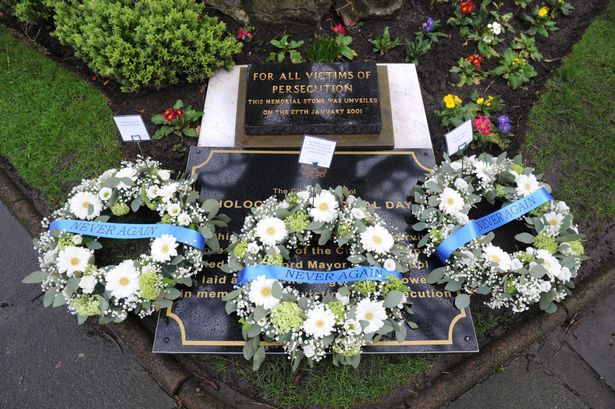A "forgotten" persecuted group of the Nazis and Adolf Hitler was subjected to collective murder which saw hundreds die at a time.
Today, Saturday, January 27, marks International Holocaust Memorial Day when we remember the six million Jews brutally murdered by the Nazis. But as well as targeting Jewish people, the Nazis also went after Roma, disabled and LGBTQ+ communities. Before Hitler came to power, in many ways, there was a period of growing freedom and acceptance for the queer community, particularly in big cities like Berlin.
The attempts to establish a democratic culture in Germany after World War I opened up opportunities for members of the community to express themselves more freely and create safe spaces to enjoy.
READ MORE: Officer who had sex with woman who made 999 call claimed he had 'no control over his actions'
READ MORE: Brianna Ghey's mum backs naming of her daughter's killers
Berlin's famous nightlife in the 1920s had a strong queer element to it with cabaret and openly gay venues beginning to thrive. Around the same time Jewish doctor and sexologist, Magnus Hirschfeld, conducted scientific research that found homosexuality and “cross-dressing” was much more widespread in society than authorities wanted to acknowledge.
However, Dr André Keil, a senior lecturer at Liverpool John Moores University, said the new sense of liberty and freedom was put to an abrupt end when Hitler was appointed chancellor.
The Modern History lecturer told the ECHO: "In the German criminal codes, paragraph 175 criminalised male homosexuality. It didn’t criminalise people being gay but criminalised sexual acts between men. It was already in the criminal code since the 19th century but prosecution under this paragraph was very rare. The authorities under the Weimar Republic did not enforce the paragraph very rigidly. But that all changed very dramatically when the Nazis come to power.”
André explained when the Nazis took power in 1933, some of the first measures put in place – alongside the destruction of democratic institutions and the persecution of political opponents – was to crack down on gay communities.
Bars and nightclubs that served as community hubs were closed by the police and gay men were arrested under Article 175 of the Penal Code. At the time there were no similar provisions for lesbians. Two years later, Nazi jurists redrafted an article which allowed them to criminalise a wide range of intimate contact between men including kissing as illegal homosexual activity.
From roughly 1936 onwards, if people were convicted under paragraph 175, they were largely sent to prison camps rather than jail – an estimated 10-15,000 men accused of homosexuality were deported to these camps. Many died in the camps from exhaustion whilst others were castrated and collective murder actions taken against gay detainees saw hundreds die at a time.
André said: "The Nazi’s persecution of queer people can be looked at as relatively straightforward. They had this conservative idea of what society was meant to look like, their ideology was based on masculinity and they wanted to produce soldiers. They had a very specific idea of male bonding and a strong emphasis on camaraderie and the military community.
“The idea of homosexuality was a threat to this because it would undermine the Nazis and security more generally. Homosexuality was seen as a weakness and as a threat to the natural order of things. But the Nazis were not unique in any way in that homophobia such as this was a view held by many at the time.”
André, who is originally from Germany, recalled how these men were forced to wear the 'pink triangle' on camp uniforms to mark them out as homosexual prisoners. In most cases, they were not just in the camp because of their sexual orientation but often because they were antifascists as well as gay.
He said: “It’s important to recognise that queer people were victims of Nazi persecution because that’s often forgotten. There are a number of reasons why they aren’t always recognised as a persecuted group – for a long time they were hidden and historians hadn’t done a lot of research until recently on this marginalised group. A lot of these people were not just persecuted because they were queer, but they were also Jewish and political opponents of the Nazi regime. Very often these kinds of characteristics would be combined.”
In one particular concentration camp, Buchenwald, 'pink triangle' prisoners were often selected by Nazi doctors for cruel medical experiments. Unsurprisingly it took the community a long time to recover.
It wasn’t until the 1960s and the cultural impact of a student movement the LGBTQ+ community reached a similar level of freedom and acceptance as they had enjoyed, at least in parts, before Hitler began his reign of terror. It was only in the early 2000s the LGBTQ+ community was recognised by the German state as a victim group of Nazi persecution and convictions by Nazi judges were repealed.
Andre said: “We’re living in a time when certain things are self-evident. We take our creative liberties and freedoms for granted but they can become under threat again. It’s absolutely essential we learn from the language of exclusion used – people don’t often just talk now and words precede actions. We need to take that seriously and be vigilant.”
Andi Herring, CEO of the LCR Pride Foundation, said the "brutal oppression" of LGBT+ victims still has a lasting impact and memory to this day. He added: "LGBT+ people at that time and since remained strong in the face of adversity and fought not only for recognition but for a better world for LGBT+ people. Today and every day, we remember the lives and sacrifices of LGBT+ people during the Holocaust. It is imperative that we continue to resist all forms of prejudice that we encounter."
Sign up for the ECHO’s LGBTQIA+ newsletter

